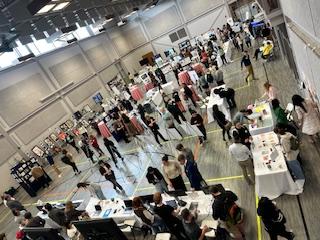
In collaboration with the Community College System of New Hampshire, the NHHC facilitates curricular innovation in spring semester courses through the Spring Symposium series. Select faculty projects centered around a theme or prompt are grant funded and incorporated into spring courses. Students and faculty gather to share their work at a symposium.
Spring 2025
“Sustaining Community and Communities”
April 11, 2025
1:00-3:00 pm
Huddleston Hall (UNH Durham)
How can we sustain our community and communities? Communities provide a foundation for civic participation, social engagement, a sense of belonging, the preservation and celebration of culture and build resilience. Strong communities can counter marginalization and foster shared understandings. Overall, communities can improve the quality of life for both individuals and society. There are calls for sustaining communities through public spaces, inclusive programs, urban planning, housing, development, public transportation, and natural resource use.
Sponsored by the University of New Hampshire College of Liberal Arts, the Global Racial and Social Inequality Lab, the New Hampshire Humanities Collaborative and the Community College System of New Hampshire, the spring 2025 symposium, “Sustaining Community and Communities,” is designed to encourage dialogue and exploration of issues related to community and communities.

Past Research Symposiums
“Memory and Memorials” Spring 2024 Symposium
April 19, 2024. Manchester Community College.
What roles do memory and memorialization play in the construction of the human experience? How do they reflect and influence racial and social inequality? The New Hampshire Humanities Collaborative (NHHC) and the UNH College of Liberal Arts and its Global Racial and Social Inequality Lab (GRSIL) offered small grants for the creation of program content for the Collaborative’s Spring Symposium entitled “Memory and Memorials." The event was designed to encourage broad dialogue and exploration of issues related to memory and memorialization through projects integrated into spring semester courses. View the program linked below to learn more about spring 2024 projects.
Memory and Memorials Symposium Program



“Live Free…” Symposium Spring 2023
April 7, 2023. New Hampshire Technical Institute.
What does it mean to be free? Why is freedom such a coveted value? What role do conceptions of freedom play in racial and social justice? How do we understand freedom and what does this mean for the humanities and social justice? For centuries humans have proclaimed the value of freedom. Vivre libre ou mourir (“Live Free or Die”) was a popular motto of the French Revolution. A similar sentiment was proclaimed by Patrick Henry during the American Revolutionary War and echoed in 1809 when General John Stark proclaimed “Live free or die…” inspiring the New Hampshire state motto. The event encourages dialogue and exploration of the idea and manifestations of freedom. To enhance the engagement by UNH and community college students, GRSIL funded faculty proposals that integrated this theme/topic into course curriculum during the semester. View the program linked below to learn more about spring 2023 projects.
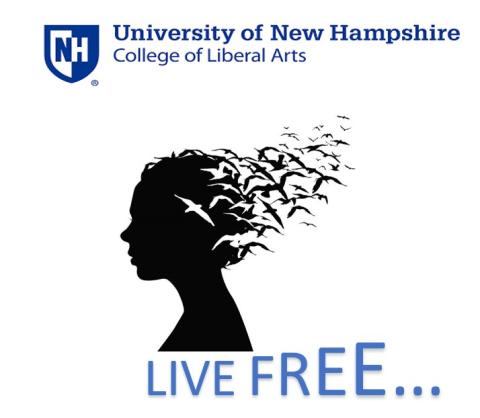
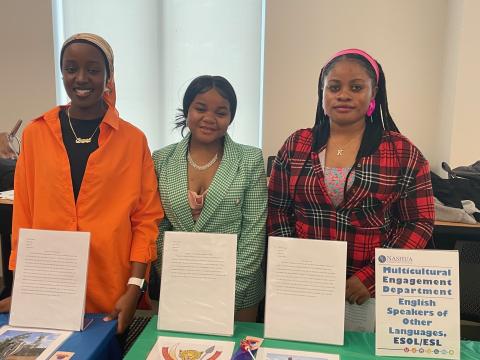

We Hold These Truths... Spring 2022 Symposium
April 8, 2022. New Hampshire Technical Institute.
What role do conceptions of truth play in racial and social inequality? The New Hampshire Humanities Collaborative (NHHC), the UNH College of Liberal Arts, and its Global Racial and Social Inequality Lab (GRSIL) offered small grants to support the creation of program content for the Collaborative’s “We Hold These Truths…” event in April 2022. The event promoted the exploration of the essential commitment expressed in the Declaration of Independence: “We hold these truths to be self-evident, that all men are created equal, that they are endowed by their Creator with certain unalienable Rights, that among these are Life, Liberty, and the pursuit of Happiness.”
We Hold These Truths... Symposium Program

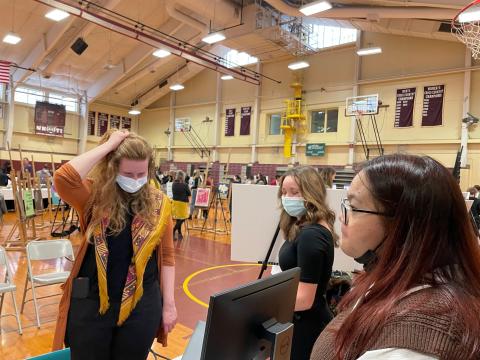
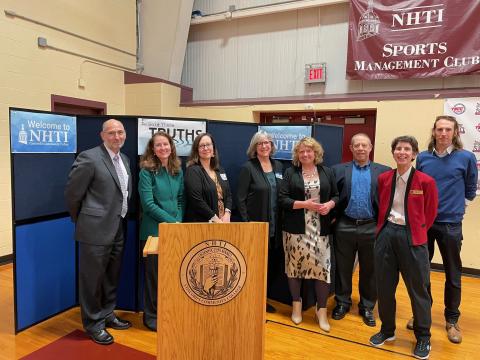
Spring 2025 Call for Proposals
Call for Proposals: “Sustaining Community and Communities” Spring 2025 Symposium
sponsored by the Global Racial and Social Inequality Lab, UNH-COLA
and the New Hampshire Humanities Collaborative
How can we sustain our community and communities? Communities provide a foundation for civic participation, social engagement, a sense of belonging, the preservation and celebration of culture and build resilience. Strong communities can counter marginalization and foster shared understandings. Overall, communities can improve the quality of life for both individuals and society. There are calls for sustaining communities through public spaces, inclusive programs, urban planning, housing, development, public transportation, and natural resource use. The UNH College of Liberal Arts and its Global Racial and Social Inequality Lab (GRSIL) invites proposals for spring 2025 course engagement with the theme “Sustaining Community and Communities” for its Spring Symposium. The event is designed to encourage dialogue and exploration of issues related to community and communities. Beyond this, GRSIL supports the goal of long-term curriculum transformation regarding impactful, student-led classroom learning.
Participants will integrate the theme into their course content and contribute to a culminating event on April 11, 2025 from 1:00-3:00 pm at the University of New Hampshire. Refreshments will be provided.
Successful applicants will receive a $750 faculty stipend ($1,250 for collaboration with a Community College System of New Hampshire (CCSNH) faculty/class. Faculty may also include a project budget up to $500. Participants will also be eligible to apply competitively for up to $3,000 in faculty development/curriculum funding to be used between January 2025 and January 2026. Funds will support faculty in acquiring new skills/knowledge to implement permanent curriculum changes. All full-time COLA faculty are eligible to apply.
Faculty participants will:
1) attend the January 10, 2025, 9:30-11:00 Winter Academy online (see below)
2) incorporate the symposium theme into a course syllabus/assignment resulting in student/class deliverables designed for presentation at the symposium
3) attend (with students) the 2025 Spring Symposium
Proposals should be 1-2 pages and include:
- Project abstract that includes summary of theme inclusion and changes to class content, assignments, assessments, or delivery methods.
- Proposal for student outputs and presentations at the April symposium.
- List of potential collaborations (if relevant), and
- Itemized budget including rationale
Proposal outputs may take the form of curriculum units, student presentations, co-creations between students and/or faculty, collaborative research, digital media, events, and other community outreach projects. Artistic expression, written works, interdisciplinarity/ transdisciplinarity projects and visual and performance-based projects are welcome. A pop-up gallery space will be available to showcase arts-based projects.
Proposals are due December 11, 2024 and should be sent to Alynna.Lyon@unh.edu.
Winter Academy: To foster symposium theme engagement and partnerships between students and faculty/staff from UNH and CCSNH, or with other New Hampshire institutions, faculty will participate in the virtual Winter Academy January 10, 2025, 9:30-11:00 online.
Proposal Evaluation Criteria:
- Rigorous and robust engagement with themes of sustaining community and communities and collective understandings
- Support of the GRSIL and NHHC mission (see https://cola.unh.edu/global-racial-social-inequality-lab)
- Feasibility of the budget and innovation
- Potential impact of the project (including, if appropriate, the number of students served and timeframe)
- Level of cross-campus engagement and collaboration
- Interdisciplinarity/transdisciplinarity focus
Examples of approaches in different disciplines:
GRSIL encourages engagement with issues relating to sustaining community and communities, how they are construed as well as scientific, social, and artistic representations of these themes (i.e., scholarship, scientific methodologies, philosophical, anthropological, literary, political, legal, global, and religious perspectives etc.).
- Art and Literature: How is community depicted, contested, and sustained through visual and written mediums?
- History and Classics: How have ideas around community and communities been treated historically, and how do they influence our understanding today?
- Race and Gender: What is the relationship between community and questions of diversity, equality, and inclusion?
- Architecture and Design: How do we understand and envision community in “place and space”? How do public spaces support communities?
- Disability Justice: What is the relationship between accessibility and the questions of community and communities?
- Language and Culture: How do different cultures/languages (present and historical) create and interpret conceptions of community?
- Music and Performance Art: How do we explore, portray, interpret, and reveal our community and communities, both individually and collectively?
- Computer Science and Technology: How does human engagement with technology influence understanding of community and communities? Is technology a threat or enhancement of community?
- Mathematics and Science: How do the disciplines of math and science establish, test, and support claims about community and communities?
- Social Sciences: How do conceptions of community and communities frame justice and legal systems? How have narratives regarding "community” or the construction of community been used as a tool of oppression and marginalization, or instruments of liberation and equality?
- Music/dance performances, art compositions, demonstrations etc.., are also encouraged.
- Individual students with relevant projects are welcome to apply independent of academic courses.
- GRSIL also seeks a graphic and digital arts class and/or students to partner in the creation of a logo, pamphlet, or poster for the event’s promotion.